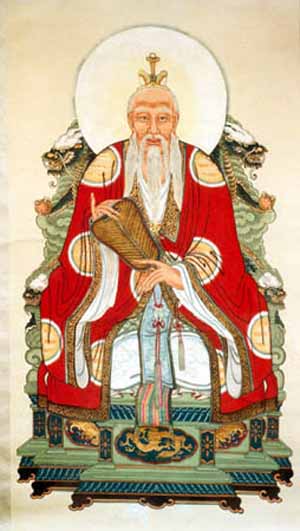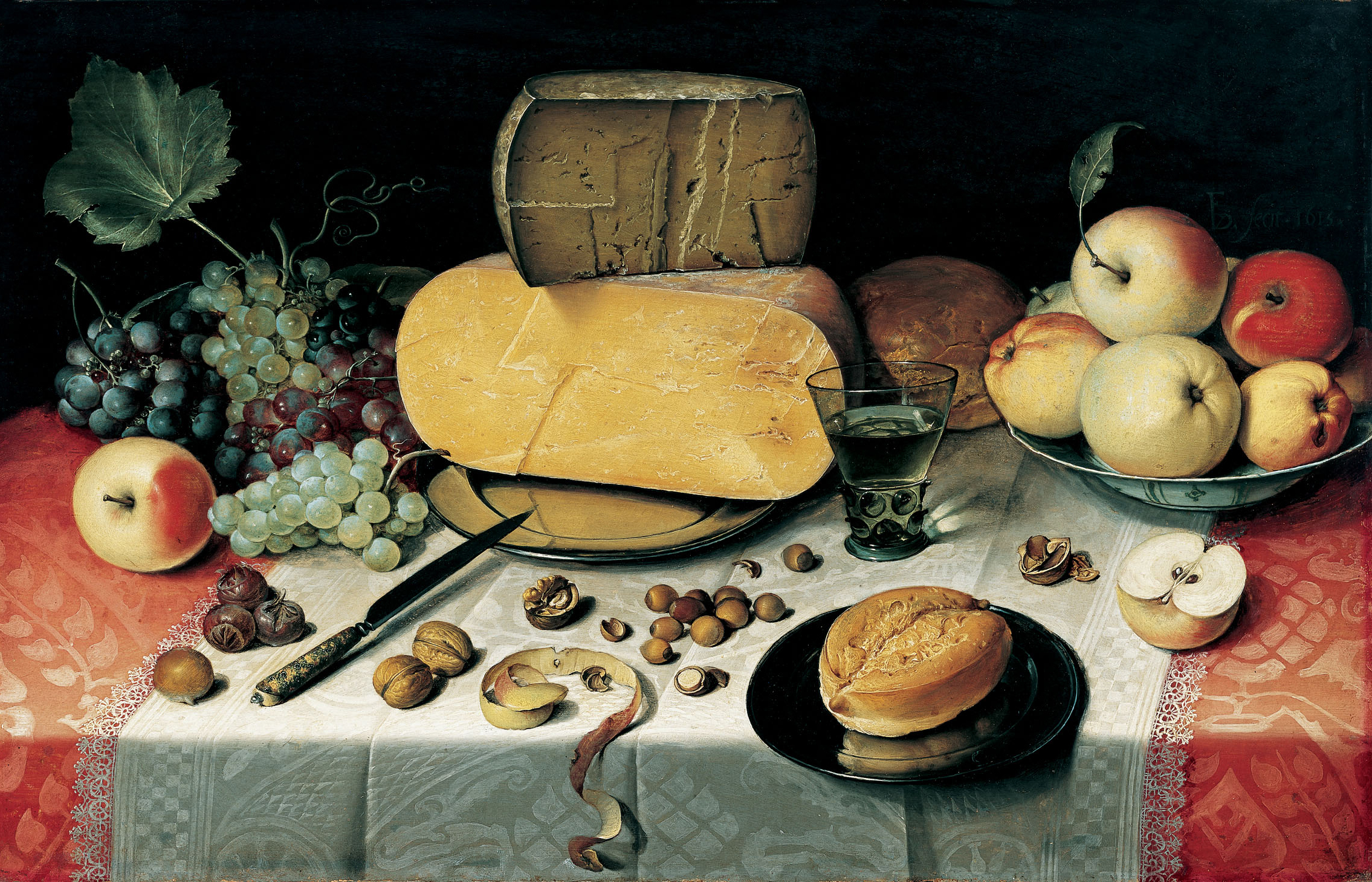
Wiki / Laotse
Inhaltsverzeichnis: (verbergen)

Steinskulptur von Laotse in Quanzhou
|
|
Der Sinn, den man ersinnen kann, |
Der große chinesische Weise und Philosoph Laotse lebte voraussichtlich im 6. Jahrhundert vor Christus. Als der Begründer des Taoismus lehrte er das Tao, das Unbenennbare, den Sinn.
Willst Du etwas schmaler machen,
musst du es sich zuvor ausweiten lassen.
Willst du etwas loswerden,
musst du es zuvor aufbauen.
Willst du etwas stürzen,
musst du es zuvor aufblühen lassen haben.
Das nennt man das verborgene Licht des Soseins der Dinge.
Das Weiche überwindet das Harte.
Das Langsame überwindet das Schnelle.
Lass Dein Wirken ein Geheimnis bleiben.
Zeig den Menschen bloß das Ergebnis.
| Quelle: ► Laotse (604-531 v. Chr.) chinesischer Weiser, Philosoph, Begründer des Taoismus, Tao te King, Vers 36, 800-200 v. Chr. |
| Siehe auch: ► Wahrnehmung |
|
| Quelle: ► Laotse (604-531 v. Chr.) chinesischer Weiser, Philosoph, Begründer des Taoismus, Tao Te King, Übersetzung Richard Wilhelm (1873-1930), Diederichs Gelbe Reihe, Band 19, S. 73, 1998, 10. Auflage 2004 |
| Source: ► Bewusstseinsebenen |
| |||||||||||||||||||||||||||||||||||||||||||||||||||||||||||||||||||||||||
| Quelle: ► Laotse (604-531 v. Chr.) chinesischer Weiser, Philosoph, Begründer des Taoismus, Tao Te King, 1911, Übersetzung Richard Wilhelm (1873-1930), Diederichs Gelbe Reihe, Band 19, Kapitel 38, 1998, 10. Auflage 2004 |
|
Zufrieden sein heißt, reich zu sein.
Andere zu kennen, bedeutet Weisheit,
Macht der Liebe
Was noch ruhig ist, lässt sich leicht ergreifen.
Ton knetend formt man Gefäße. |
| Quelle: ► Laotse (604-531 v. Chr.) chinesischer Weiser, Philosoph, Begründer des Taoismus, Tao te King 800-200 v. Chr. |
|
| ||||||||||||||||||||||||||
| ||||||||||||||||||||||||||
Das Allerweichste im Universum durchdringt das Allerhärteste. Das, was nicht stofflich ist, kann auch dort eindringen, wo kein Raum ist.
|
|
Wenn man sich immer nur in einer Ecke aufhält und die zahlreichen Aspekte der Gesamtheit vernachlässigt, wenn man immer nur eins nimmt und den Rest weglegt, dann wird der Erfolg nur klein und der Sieg nur oberflächlich sein.
|
|
|
Obwohl die meisten Menschen ihr gesamtes Leben damit verbringen, ihrem biologischen Impuls zu folgen, ist dies nur ein winziger Teil unseres Wesens. Wenn wir von Samen und Eiern besessen bleiben, sind wir zwar mit dem fruchtbaren Tal der Fortpflanzung der Mysteriösen Mutter verbunden, doch nicht mit ihrem unermesslichen Herzen und allwissenden Geist.
Die drei Arten der Integration von Yin und Yang sind:
Weil immer höhere Vereinigungen von Yin und Yang für die Empfängnis immer höheren Lebens notwendig sind, können einige Lernende in der Kunst der ge-
Das Ergebnis davon ist eine verbesserte Gesundheit, ausgeglichene Emotionen, das Ende von drängenden Impulsen
Der Zugang eines Menschen zur Sexualität ist ein Kennzeichen seiner Entwicklungsebene. Wenig entwickelte Menschen praktizieren gewöhnlichen Geschlechtsverkehr. Sie überbetonen die Geschlechtsorgane und vernachlässigen dabei die übrigen Organe und Systeme des Körpers.
Die Fesseln der Leidenschaft und des Begehrens weben ein festes Netz um uns […] Die Falle der Dualität ist hartnäckig. Gebunden, starr und gefangen kann man keine Befreiung erlangen. Durch gegenseitige Kultivierung ist es möglich, das Netz zu entwirren, die Starrheit aufzuweichen und die Falle zu öffnen. Indem wir unsere Yin-Energie in der Quelle des universellen Lebens aufgehen lassen und aus der gleichen Quelle die Yang-Energie beziehen, lassen wir die Individualität hinter uns, und unser Leben wird rein und natürlich. Frei von Ego leben wir natürlich, arbeiten rechtschaffen, werden von unerschöpflicher Vitalität erfüllt und sind für immer vom Rad der Geburt und des Todes befreit. |
|
Empfehlung / Einsicht
|
| Literaturempfehlung: ► Buch: Marnia Robinson, US-amerikanische ehemalige Firmenanwältin, Forscherin, Autorin zu altehrwürdigen Empfehlungen zur heiligen Sexualität, Das Gift an Amors Pfeil. Von der Gewohnheit zum Gleichgewicht in sexuellen Beziehungen, Arbor Verlag, 20. April 2010 |
| Removed written reference: ► Article by Marnia Robinson, US American former corporate lawyer, researcher, author on ancient sacred-sex prescriptions, Into the Realm of Bliss and Wholeness, presented by reuniting.info, 11. Mai 2005 |
| Referenz: de.Wikipedia-Eintrag ► Huahu jing, ~300 v. Chr. |
| Reference: de.Wikipedia entry ► Huahujing, ~300 BC |
| Siehe auch: ► Sexualität und ► Seele und ► Spirit und ► Körperlichkeit und ► Ganzheit und ► Integration |
| See also: ► Three Daoist types of Yin ∞ Yang integration and sacred sexuality |
Recommendations
Insights
|

| ||||||||||||||||||||
| |||||||||||||||
Love, moderation, humility

A.H. Almaas, Ph.D. (*1944) Kuwaitian physicist, spiritual teacher, founder of the therapeutic Diamond Approach, author, The Pearl Beyond Price. Integration of Personality into Being. An Object Relations Approach, S. 10, Diamond Books, 1st edition 5. September 2000
|
Empfehlung

| See also: ► Linearity ⇔ Nonlinearity and ► Tao |
Laozi [Lao Tzu, Lao Tse, Lao Tu, Lao-Tsu, Laotze, Laosi, Laocius] was a philosopher of ancient China, best known as the au-
thor of the Tao Te Ching. His association with the Tao Te Ching has led him to be traditionally considered the founder of phi-
losophical Taoism (pronounced as "Daoism"). He is also revered as a deity in most religious forms of Taoist philosophy, which often refers to Laozi as Taishang Laojun, or "One of the Three Pure Ones". Tao Te Ching, presented by Wikisource
Peak orgasm: "The peak orgasm" – It is the goal of conventional sex. One applies force and effort to rush to the summit and collapses into a prolonged phase of recovery. Dopamine levels peak and crash accordingly.
Valley orgasm: "The valley orgasm" – Taoists taught a non-orgasmic practice. Unconventional sex is very peaceful, ecstatic, extended, merging experience. One reaches a state of non-attachment and deep union while exchanging Divine power. It cannot be forced. It does not trigger high-dopamine spurts.
|
| References: ► Book Hua Hu Ching [Huahujing] (~300 CE), cited in: article Into the Realm of Bliss and Wholeness, presented by Marnia Robinson, US American former corporate lawyer, researcher, author on ancient sacred-sex prescriptions, reuniting.info, 11. May 2005 ► Article Bad Lao Tzu meme adds to growing list of mis-identified quotes online, presented by Scripturient, Ian Chadwick, 7. February 2012 |
| See also: ► Sexuality and ► Soul and ► Physicalness and ► Wholeness and ► Integration |
| Siehe auch: ► Zitate über Heilige Sexualität von Laotse / Huahu jing |
| ||||||||||||
|
| |||||||||||||||||||||||||||||||||||||||||||||||||||||||||||||||||||||||||
| Source: ► Lao Tzu (604-531 BC) Chinese sage, philosopher, founder of Daoism, Tao Te Ching [The Book of the Way], verse 38, 800-200 BC |
|
| Source: ► Lao Tzu (604-531 BC) Chinese sage, philosopher, founder of Daoism, Tao Te Ching [The Book of the Way], verse 38, 800-200 BC |
| |||||||||||||||||||||||||||||||
| Source: ► Hua Hu Ching. The Unknown Teachings of Lao Tzu, translated by Brian Walker, verse 66, HarperOne, San Francisco, 1995, Harper Collins, revised edition 4. August 2009 |
| See also: ► Consciousness-Tables and ► Virtue and ► Sexuality and ► Tables I and ► Tao ► Daoist Sacred sexuality, excerpted from Hua Hu Ching, ~300 CE and ► Quotes on Karezza |
| ||||||||||||||||||||||||||||||||
| Reference: ► Article The Science of Love, presented by the British Broadcasting Corporation (BBC), undated |
|
| ||||||||||||||||||||||||||||||||||||||||||||||||||||||||||||||||||||||||||||||||||||||||||||||||||||||||||||||||||||||||||||||||||||||||||||||||||||||||||||||||||||||||
|
Study results on three distinct emotion-motivation systems (drives) governing mammalian mating behavior Mammals and birds have evolved three primary, discrete, interrelated emotion-motivation systems in the brain for mating, reproduction, and parenting: lust, attraction, and male-female attachment. Each emotion-motivation system is associated with a specific constellation of neural correlates and a distinct behavioral repertoire.
The evolution of these three emotion-motivation systems contribute to contemporary patterns of marriage, adultery, divorce, remarriage, stalking, homicide and other crimes of passion, and clinical depression due to romantic rejection.
Abstract by Helen Fisher, Ph.D. (*1945), A. Aron, D. Mashek, H. Li, L.L. Brown, Defining the brain systems of lust, romantic attraction, and attachment, archived by the free MEDLINE database PubMed, published by the peer-reviewed academic journal in sexology Archives of Sexual Behavior, volume 31, issue 5, S. 413-419, October 2002
|
| Sources on Fisher's thesis on Sex drive, Romantic love, Longterm attachment featuring Helen Fisher, Ph.D. (*1945) Canadian-American research professor of biological anthropology and human behavior, Center for Human Evolutionary Studies, Rutgers University, expert on romantic interpersonal attraction, chief scientific adviser to Chemistry.com, author ► Removed Video interview Why We Love: The Nature and Chemistry of Romantic Love, presented by The Science Network (TSN), host Roger Bingham, location "The Book Works," Del Mar, California, 43:00 minutes duration, 8. June 2006 ► Video presentation Helen Fisher tells us why we love and cheat, presented by TED Talks, Vimeo film, 23:29 minutes duration, filmed February 2006, posted March 2012 ► Video presentation The brain in love, presented by TED Talks 2006, 15:56 minutes duration, filmed February 2008, posted July 2008 |
| See also: ► Three mating circuits (drives) in the brains of humans and animals and ► Correlated typology chart ► Intimacy / Trust and ► Tao and ► Principle 3:1 and ► Marriage and ► Integration |
| See also – Spiritual bonding: ► Daoist Sacred sexuality, excerpted from Hua Hu Ching, ~300 CE ► Quotes on Karezza |
| Siehe auch: ► Biologie der drei grundlegenden menschlichen Paarungstriebe |
|
|
|
|
Pride attaches undue importance to the superiority of one's status in the eyes of others. |
| Source: ► Lao Tzu (604-531 BC) Chinese sage, philosopher, founder of Daoism, Tao Te Ching [The Book of the Way], verse 13, 800-200 BC |
| See also: ► Pride and ► Level 20 – Shame and ► Level 30 – Guilt |
Links zum Thema Laotse / Lao TzuLiteratur
Literature (engl.)
The "I Ching and the Genetic Code" is an important and exciting link between science and spirituality.
The genetic code and the I Ching carry the fractals of chaos theory based on a mathematical structure and fractal patterning. The nonlinear
Externe Weblinks
External web links (engl.)
Audio- und VideolinksAudio and video links (engl.)
DNA and I Ching link in a master code that shapes the fractal universe.
Linkless media offering
|
Hawkins
1 Article on Liu Yi, Towards a New Understanding of Huahujing (The scripture of transforming the barbarians) from Dunhuang, International Dunhuang Project Newsletter 7, presented by IDP, issue No. 7, spring 1997 ⇑
2 Removed article Your Brain on Sex, presented by reuniting.info, Marnia Robinson, US American former corporate lawyer, researcher, author on ancient sacred-sex prescriptions, 25. June 2005 ⇑
5 This spiritual-energery etheric brain identifies with context rather than content. Dr. David R. Hawkins, Discovery of the Presence of God. Devotional Nonduality, S. 115, 2007 ⇑
6 The etheric brain activates the energy within the neurons. Consciousness creates neuronal activity. Dr. David R. Hawkins, Sedona seminar unnamed, date unknown ⇑
7 Spiritual intention changes the brain's physiology – spiritually oriented people experience things differently than "ordinary" people. The change occurs in the prefrontal cortex, creating an "etheric brain." (Calibrated as a fact.) [The etheric brain does not exist in individuals below 200 LoC.] The shift above LoC 200 speeds up karma. […] Rapid pathway bypasses the emotional centers of the brain. The majority of Homo sapiens do not have an etheric brain. The new species of individuals calibrating over 200 is "homo spiritus." Under 200, the left brain is dominant and individuals are more prone to disease, depression, addiction, and rage. Dr. David R. Hawkins, Sedona Seminar Realization of the Self and the "I", 3 DVD set, 1. November 2003 ⇑
8 One profound consequence of the emergence of an etheric brain is its survival of a physical death and the accumulation of karmic patterns. Dr. David R. Hawkins, Truth vs. Falsehood. How to Tell the Difference, S. 68, 2005 ⇑
9 Arthur Aron, Helen Fisher, Debra J. Mashek, Greg Strong, Haifang Li, and Lucy L. Brown, "Reward, Motivation, and Emotion Systems Associated With Early-Stage Intense Romantic Love", presented by the monthly peer-reviewed scientific journal Journal of Neurophysiology, S. 327-337, volume 94, issue 1, May 2005 ⇑
10 Four-stroke cycles of generations – Strauss and Howe ⇑
11 Genesis 1, 22 (AT) ⇑
12 Matthew 5, 48 (NT) ⇑